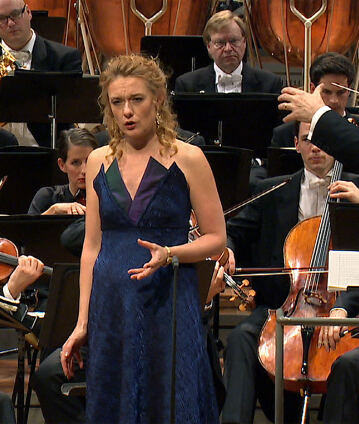Simon Rattle and Magdalena Kožená with songs by Dvořák and Mahler

Delicate melancholy characterises this concert with Simon Rattle. Mezzo-soprano Magdalena Kožená sings songs by Dvořák and Mahler which find the greatest intensity of expression through concentration and restraint. The same applies to Ravel’s Le Tombeau de Couperin, which combines mourning with Baroque grace. A similar approach but with a more voluminous sound is to be found in Schubert’s Unfinished Symphony with its intense world-weariness.
The songs in this programme are by composers who are normally associated with an extravagantly rich sound, but here we see a different facet. Thus, the driving force in Antonín Dvořák’s Biblical Songs is not so much the folkloric verve of earlier vocal works as the intimate immersion in the psalm texts which underlie the songs. Also in Mahler’s Rückert Lieder, we are confronted not by the creator of gigantic symphonies, but by the sensitive philosopher, who – as it says in one of the songs – “is lost to the world.”
The concert opens with Maurice Ravel’s Le Tombeau de Couperin, which was written in memory of the composer’s fallen war comrades. As the title suggests, the work also pays homage to François Couperin (1668–1733), explaining the interesting mixture of mourning with Baroque grace. Franz Schubert’s Unfinished Symphony stands in contrast to such controlled expression. The shrouded mood portrayed in the opening bars soon turns into unbridled despair. While there are moments of rebellion and lightening of mood, the world-weariness of this music is all the more intense when set against this background.
As an added extra, there are two bonuses by Luciano Berio and Maurice Ravel, recorded at concerts on 25 and 26 January, which were performed as part of a change of programme. The concert opened with Berio’s Ritorno degli snovidenia (“The return of dreams”) for solo cello and chamber orchestra – a musical treatment of the destruction of revolutionary ideals during Stalinism. The solo part, composed for Mstislav Rostropovich, is played in our recording by Olaf Maninger, principal cellist of the Berliner Philharmoniker. He is accompanied by members of the Karajan Academy of the Berliner Philharmoniker. The second item is Ravel’s magical, exotic song cycle Shéhérazade, sung by Magdalena Kožená.
© 2012 Berlin Phil Media GmbH
Related interviews
Artists
Our recommendations
- “Pelléas et Mélisande” with Simon Rattle, Christian Gerhaher and Magdalena Kožená
- Sir Simon Rattle conducts Mahler’s Symphony No. 2
- Simon Rattle conducts Mozart and Strauss at the 2006 New Year’s Eve Concert
- Simon Rattle conducts Mahler’s Second Symphony
- Iván Fischer and Lisa Batiashvili
- Europakonzert from Prague with Sir Simon Rattle and Magdalena Kožená